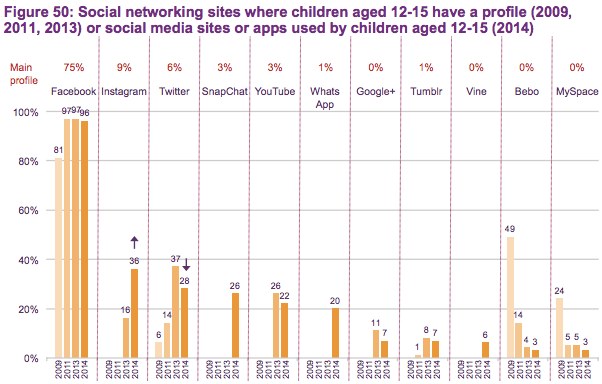One In Three U.K. Children Now Owns A Tablet — Instagram, SnapChat, WhatsApp Use Also Rising
Last October
research put out by the UK’s telecoms regulator, Ofcom, highlighted
rising usage of tablets among kids. Unsurprisingly that trend has
continued, with Ofcom’s 2014 annual report exploring parents’
and children’s media use finding that tablet ownership by children in
the U.K. has now risen as high as one in three.
Among children aged between 5 and 15, Ofcom found that a third (34%)
now own their own tablet, i.e. rather than using devices belonging to
their parents or school. That’s up from a fifth (19%) back in 2013.
Kids’ tablet ownership is even rising at the lower end of the age
bracket, with around one in ten (11%) children aged 3 to 4 years now
having their own tablet, up from just 3% last year.
The 2014 report also notes that twice as many kids aged 5 to 15 years
old are using a tablet to go online (42% versus 23% in 2013).
It argues this could have implications for the future use of laptops
and PCs — especially given the report notes a drop in the proportion of
children accessing the internet on a PC, laptop or netbook. Ofcom says
this fell for the first time (since it began this annual survey back in
2005) — dropping by three percentage points, year on year, to 88%.
Meanwhile smartphone ownership among kids has remained steady,
according to Ofcom, with the 2014 report recording that a fifth (20%)
of 8-11s own a handset, and 65% of 12-15 year olds.
The report suggests tablets are replacing TV sets in kids’ bedrooms,
with the latter proportion dropping by a third over the past five years
(from 66% in 2009 to 46% in 2014). Meanwhile the proportion of kids
watching TV shows on tablets is on the rise — up by a third in a year,
from 15% in 2013 to 20% in 2014.
Gaming on tablets is also on the rise among U.K. kids. It’s up from
23% last year to 30% in 2014. But use of dedicated gaming devices is
dropping, down from 81% in 2013 to 77% in 2014.
Kids’ social media usage increasingly diverse
The report also explores social media usage by children in the U.K.,
shedding some light on the relative popularity of various digital
services among this age group.
According to Ofcom’s data, Facebook remains a staple for U.K. kids,
with almost all surveyed children (96%) reporting they have a profile on
the site — a proportion that has remained largely unchanged since 2011.
However the proportion of kids who identify Facebook as their “main
social profile” has declined. The report notes that has dropped from 87%
in 2013 to 75% in 2014.
Meanwhile other social serviced have bubbled up, with usage of
Instagram, SnapChat and WhatsApp specifically all growing since last
year’s survey — although their proportional usage lags far behind
Facebook. Still, given that the relative attraction of using additional
social service to Facebook is likely to be for kids to seek out a
smaller niche group of users (i.e. which does not include their parents)
that’s to be expected.
Of these additional social services, Instagram has currently carved
out the biggest niche among U.K. kids after Facebook — with some 36% of
respondents saying they now use the photo sharing site, and 9%
identifying it as their main social profile.
That’s followed by 26% who say they use SnapChat, and 20% who are
using WhatsApp. Both Instagram and WhatsApp are owned by Facebook, of
course. But SnapChat remains independent, having shunned various suitors.
On the falling out of favor front, the Ofcom report shows usage of
Twitter among U.K. kids has declined after three prior years of growth,
down from 37% last year to 28% this year. While Google-owned YouTube has
also dipped slightly in usage, dropping from 26% to 22%.
The report underlines how fickle digital fashions can be among this
age group, with erstwhile U.K. kids’ digital social favorite Bebo
rapidly falling from a usage rate of nearly half (49%) back in 2009 to a
mere 3% in 2014.


0 comments:
Post a Comment